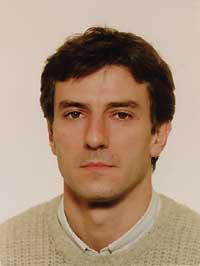Lexicography
Last August, when in one of those organized (or semi-organized) trips we were chatting some friends we had just met, someone began to be a tireless pimp that is sent to all holiday groups, asking what work each one did. Of course, there was everything there, teachers (more than one of course), a couple of lawyers, welding machine designer, glasses designer, doctor, photographer… When the turn came I didn’t know what to say. If I have to start now — I thought among myself — to explain everything we do in Elhuyar, I will get bored. In the company there are many things, but I myself… Those who work with words find it difficult to say at the same time what they do with those tools and work objectives.

I was satisfied saying that I dedicate myself to making dictionaries and encyclopedias. If I have to tell the truth, I didn’t hear anyone “what an interesting job.” But I'm convinced that's what they thought. Only one opened his mouth, a Catalan, to say that it is an ugly work and a little boring, and simple, because dictionaries are made of dictionaries. I got nothing. All looking at me, I realized the ridicule I was doing trying to know. But I was on vacation. This morning, when I started thinking about what to write about Elhuyar's vocabulary, and I didn't think of any form, the words of that friend or acquaintance of the holiday came to me. At the end of the trip there is a habit of signing up addresses and phone, usually for nothing, but on this occasion, at least, I thought to send it to him:
“ Dear …:
He says dictionaries are made from dictionaries. And surely you have no reason. We have recognized this when we have presented the Elhuyar Encyclopedic Dictionary, the Modern Basque Dictionary and the Euskera-Castellano/Castellano-Vasco Elhuyar Hiztegia Dictionary and the Student Dictionary, and you will not know them, but well, Azkue, Lhande, Mitxelena, Sarasñzerez, Kintana, etc. because we are debtors of them. There is no one who has started making a
dictionary or encyclopedia from scratch. Because the language changes. Because words enter our life and come out of it. Or because this time you think you need a small dictionary for young people and then a bigger dictionary for translators and technicians. But
that's not what I meant to you. That is, we are “normalizing” (also called “normalizing”, but perhaps we have less hope for it). And that's why, for example, when we started to develop the Encyclopedic Dictionary in 1990, it was not clear how to write names of people and foreign places in Basque. A “system” was needed and by proposing a system we published two books, Local Names of the
World and Names of People of the World. Or in the lexicon, for example, we have had to make a lot of new definitions, since the Basque language has begun to explain itself in recent years, because there was no definition of words or because the one that had problems. Or in doing the Elhuyar Euskara-Castellano/Castellano-Vasco Dictionary, we realized that there were words in Spanish that had not been worked in any dictionary or previous work. Or seeing that the problem that had been given very different, incompatible solutions, we consulted with experts and proposed solution. And this is how we are, that Euskaltzaindia has made such a decision and has been translated into the vocabulary, or in the Basque texts or in the media I do not know what to say to know and talk about the expression that has prevailed, or that in the public administration they have decided not to use and have opted for the lexicography, or they have introduced novelties in a terminological work, or I do not know what to translate that translator, it has been. And all this why? Because we thought that the works we have published were necessary and we believe that the Basques had gaps, because we have tried to fill them (when we published the Encyclopedic Dictionary in 1993, there was
no such thing in Basque and the Euskara-Gaztelania dictionary /Castellano-Vasco Elhuyar Hiztegia had published many years without renewing this type of dictionaries, in 1996). And the best way to do this is “haika mutiloa, jaiki hadi, externally what is mira hadi”, instead of matching words looking at the navel itself. You do not know how the dictionaries and encyclopedias area has flourished in recent years in Basque. Now we have many things, including CD-ROMs (we have published two). And we are
happy because Elhuyar has done something to make that happen. But we still need many machines. That is, from Elhuyar we want to continue working on this task. The last thing I have to say is that maybe you were right when you said that ours is not a complicated task, and that dictionaries are made of dictionaries… well, for us to be friends I will make you a little honored. But you don’t know what work is beautiful.”
Before sending it to my Catalan friend, I wanted to show it to you. If there was a lot of nonsense, hey, I wouldn't want to make the ridicule before her again.
Buletina
Bidali zure helbide elektronikoa eta jaso asteroko buletina zure sarrera-ontzian











